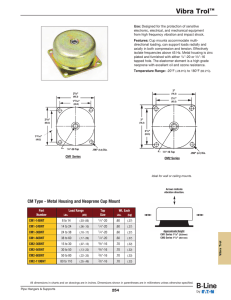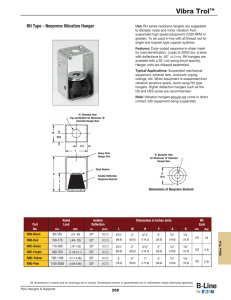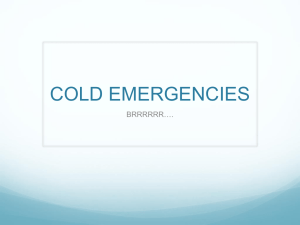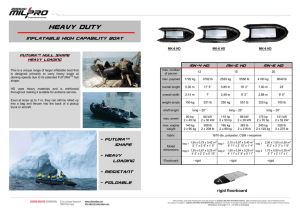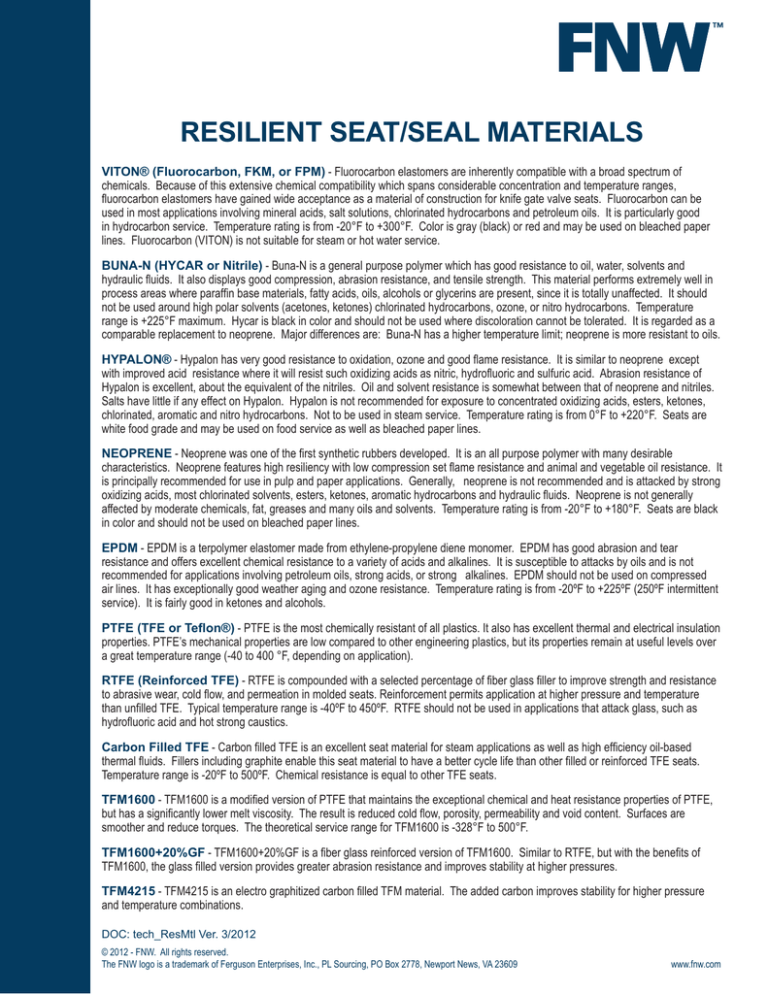
RESILIENT SEAT/SEAL MATERIALS
VITON® (Fluorocarbon, FKM, or FPM) - Fluorocarbon elastomers are inherently compatible with a broad spectrum of
chemicals. Because of this extensive chemical compatibility which spans considerable concentration and temperature ranges,
fluorocarbon elastomers have gained wide acceptance as a material of construction for knife gate valve seats. Fluorocarbon can be
used in most applications involving mineral acids, salt solutions, chlorinated hydrocarbons and petroleum oils. It is particularly good
in hydrocarbon service. Temperature rating is from -20°F to +300°F. Color is gray (black) or red and may be used on bleached paper
lines. Fluorocarbon (VITON) is not suitable for steam or hot water service.
BUNA-N (HYCAR or Nitrile) - Buna-N is a general purpose polymer which has good resistance to oil, water, solvents and
hydraulic fluids. It also displays good compression, abrasion resistance, and tensile strength. This material performs extremely well in
process areas where paraffin base materials, fatty acids, oils, alcohols or glycerins are present, since it is totally unaffected. It should
not be used around high polar solvents (acetones, ketones) chlorinated hydrocarbons, ozone, or nitro hydrocarbons. Temperature
range is +225°F maximum. Hycar is black in color and should not be used where discoloration cannot be tolerated. It is regarded as a
comparable replacement to neoprene. Major differences are: Buna-N has a higher temperature limit; neoprene is more resistant to oils.
HYPALON® - Hypalon has very good resistance to oxidation, ozone and good flame resistance. It is similar to neoprene except
with improved acid resistance where it will resist such oxidizing acids as nitric, hydrofluoric and sulfuric acid. Abrasion resistance of
Hypalon is excellent, about the equivalent of the nitriles. Oil and solvent resistance is somewhat between that of neoprene and nitriles.
Salts have little if any effect on Hypalon. Hypalon is not recommended for exposure to concentrated oxidizing acids, esters, ketones,
chlorinated, aromatic and nitro hydrocarbons. Not to be used in steam service. Temperature rating is from 0°F to +220°F. Seats are
white food grade and may be used on food service as well as bleached paper lines.
NEOPRENE - Neoprene was one of the first synthetic rubbers developed. It is an all purpose polymer with many desirable
characteristics. Neoprene features high resiliency with low compression set flame resistance and animal and vegetable oil resistance. It
is principally recommended for use in pulp and paper applications. Generally, neoprene is not recommended and is attacked by strong
oxidizing acids, most chlorinated solvents, esters, ketones, aromatic hydrocarbons and hydraulic fluids. Neoprene is not generally
affected by moderate chemicals, fat, greases and many oils and solvents. Temperature rating is from -20°F to +180°F. Seats are black
in color and should not be used on bleached paper lines.
EPDM - EPDM is a terpolymer elastomer made from ethylene-propylene diene monomer. EPDM has good abrasion and tear
resistance and offers excellent chemical resistance to a variety of acids and alkalines. It is susceptible to attacks by oils and is not
recommended for applications involving petroleum oils, strong acids, or strong alkalines. EPDM should not be used on compressed
air lines. It has exceptionally good weather aging and ozone resistance. Temperature rating is from -20ºF to +225ºF (250ºF intermittent
service). It is fairly good in ketones and alcohols.
PTFE (TFE or Teflon®) - PTFE is the most chemically resistant of all plastics. It also has excellent thermal and electrical insulation
properties. PTFE’s mechanical properties are low compared to other engineering plastics, but its properties remain at useful levels over
a great temperature range (-40 to 400 °F, depending on application).
RTFE (Reinforced TFE) - RTFE is compounded with a selected percentage of fiber glass filler to improve strength and resistance
to abrasive wear, cold flow, and permeation in molded seats. Reinforcement permits application at higher pressure and temperature
than unfilled TFE. Typical temperature range is -40ºF to 450ºF. RTFE should not be used in applications that attack glass, such as
hydrofluoric acid and hot strong caustics.
Carbon Filled TFE - Carbon filled TFE is an excellent seat material for steam applications as well as high efficiency oil-based
thermal fluids. Fillers including graphite enable this seat material to have a better cycle life than other filled or reinforced TFE seats.
Temperature range is -20ºF to 500ºF. Chemical resistance is equal to other TFE seats.
TFM1600 - TFM1600 is a modified version of PTFE that maintains the exceptional chemical and heat resistance properties of PTFE,
but has a significantly lower melt viscosity. The result is reduced cold flow, porosity, permeability and void content. Surfaces are
smoother and reduce torques. The theoretical service range for TFM1600 is -328°F to 500°F.
TFM1600+20%GF - TFM1600+20%GF is a fiber glass reinforced version of TFM1600. Similar to RTFE, but with the benefits of
TFM1600, the glass filled version provides greater abrasion resistance and improves stability at higher pressures.
TFM4215 - TFM4215 is an electro graphitized carbon filled TFM material. The added carbon improves stability for higher pressure
and temperature combinations.
DOC: tech_ResMtl Ver. 3/2012
© 2012 - FNW. All rights reserved.
The FNW logo is a trademark of Ferguson Enterprises, Inc., PL Sourcing, PO Box 2778, Newport News, VA 23609 www.fnw.com

